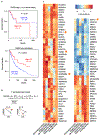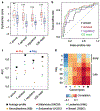Signatures of T cell dysfunction and exclusion predict cancer immunotherapy response
- PMID: 30127393
- PMCID: PMC6487502
- DOI: 10.1038/s41591-018-0136-1
Signatures of T cell dysfunction and exclusion predict cancer immunotherapy response
Abstract
Cancer treatment by immune checkpoint blockade (ICB) can bring long-lasting clinical benefits, but only a fraction of patients respond to treatment. To predict ICB response, we developed TIDE, a computational method to model two primary mechanisms of tumor immune evasion: the induction of T cell dysfunction in tumors with high infiltration of cytotoxic T lymphocytes (CTL) and the prevention of T cell infiltration in tumors with low CTL level. We identified signatures of T cell dysfunction from large tumor cohorts by testing how the expression of each gene in tumors interacts with the CTL infiltration level to influence patient survival. We also modeled factors that exclude T cell infiltration into tumors using expression signatures from immunosuppressive cells. Using this framework and pre-treatment RNA-Seq or NanoString tumor expression profiles, TIDE predicted the outcome of melanoma patients treated with first-line anti-PD1 or anti-CTLA4 more accurately than other biomarkers such as PD-L1 level and mutation load. TIDE also revealed new candidate ICB resistance regulators, such as SERPINB9, demonstrating utility for immunotherapy research.
Figures





Comment in
-
Signatures IMPRES and might turn the TIDE in predicting responses.Nat Rev Clin Oncol. 2018 Nov;15(11):654. doi: 10.1038/s41571-018-0088-x. Nat Rev Clin Oncol. 2018. PMID: 30171205 No abstract available.
References
-
- Mahoney KM, Rennert PD & Freeman GJ Combination cancer immunotherapy and new immunomodulatory targets. Nat. Rev. Drug Discov 14, 561–584 (2015). - PubMed
Publication types
MeSH terms
Substances
Grants and funding
LinkOut - more resources
Full Text Sources
Other Literature Sources
Research Materials

